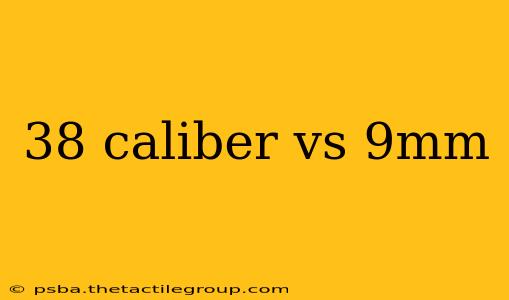Choosing the right caliber for self-defense or recreational shooting is a crucial decision. This detailed comparison of .38 Special and 9mm Luger (9x19mm Parabellum) ammunition will help you understand the key differences and determine which might be better suited for your needs. We'll delve into ballistics, availability, cost, and recoil, providing a balanced perspective to aid your decision-making process.
Ballistics: Power and Penetration
The core difference lies in their ballistics. While both calibers are effective for self-defense, they achieve this through different means.
.38 Special:
- Caliber: .38 inches (9.65mm)
- Generally Lower Velocity: .38 Special cartridges typically exhibit lower velocity compared to 9mm.
- Heavier Bullets: Compensates for lower velocity with heavier bullet weights, often ranging from 125 to 158 grains.
- Stopping Power: Relies more on bullet weight and expansion for stopping power. .38 Special +P loads offer increased performance.
- Penetration: Penetration can vary significantly depending on the bullet type. While sufficient for self-defense, overpenetration is a potential concern, particularly with full metal jacket (FMJ) rounds.
9mm Luger (9x19mm Parabellum):
- Caliber: 9mm (9x19mm)
- Higher Velocity: Generally boasts higher velocity than .38 Special.
- Lighter Bullets: Often uses lighter bullets, ranging from 115 to 147 grains.
- Stopping Power: Achieves stopping power through a combination of velocity and bullet design (hollow points, for instance).
- Penetration: Offers a good balance between penetration and expansion, reducing the risk of overpenetration compared to some .38 Special loads. However, bullet type greatly influences penetration.
Availability and Cost: Practical Considerations
Both .38 Special and 9mm ammunition are widely available, making them readily accessible for most shooters. However, 9mm generally enjoys broader availability and often comes at a lower cost per round, particularly in bulk purchases. This makes 9mm a more economical choice for practice and training.
Recoil and Shootability: Comfort and Control
Recoil is a subjective experience, influenced by firearm weight and design. Generally, 9mm exhibits less felt recoil than .38 Special, making it potentially easier for beginners or those with smaller hands to handle and control accurately. However, .38 Special’s recoil isn't excessively harsh, particularly in heavier revolvers.
Handgun Choices: Revolvers vs. Semi-Automatics
A significant difference is the type of firearm typically associated with each caliber. .38 Special is strongly linked to revolvers, offering a simple, reliable platform. 9mm, on the other hand, is predominantly used in semi-automatic pistols, allowing for higher magazine capacity and faster follow-up shots. This is a major factor influencing which caliber to choose, as the firearm's characteristics are as important as the ammunition.
Conclusion: The Best Choice Depends on Your Needs
There's no single "best" caliber. The optimal choice between .38 Special and 9mm hinges on your specific needs and preferences:
-
.38 Special: Might be preferred by those who prioritize a simple, reliable revolver platform, readily available ammunition (though potentially at a higher cost), and a heavier hitting bullet.
-
9mm: Is often favored for its lower recoil, higher magazine capacity (in semi-automatic pistols), wider availability, and lower cost per round, making it ideal for both self-defense and regular practice.
Ultimately, handling both calibers, if possible, and considering the factors outlined above will help you make an informed decision that aligns with your skill level, budget, and intended use. Always consult with experienced firearm professionals and practice regularly to become proficient with your chosen caliber.

